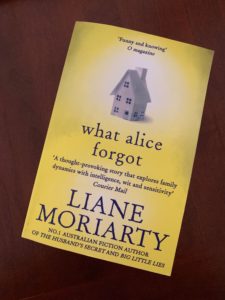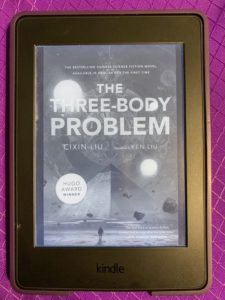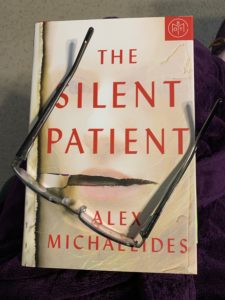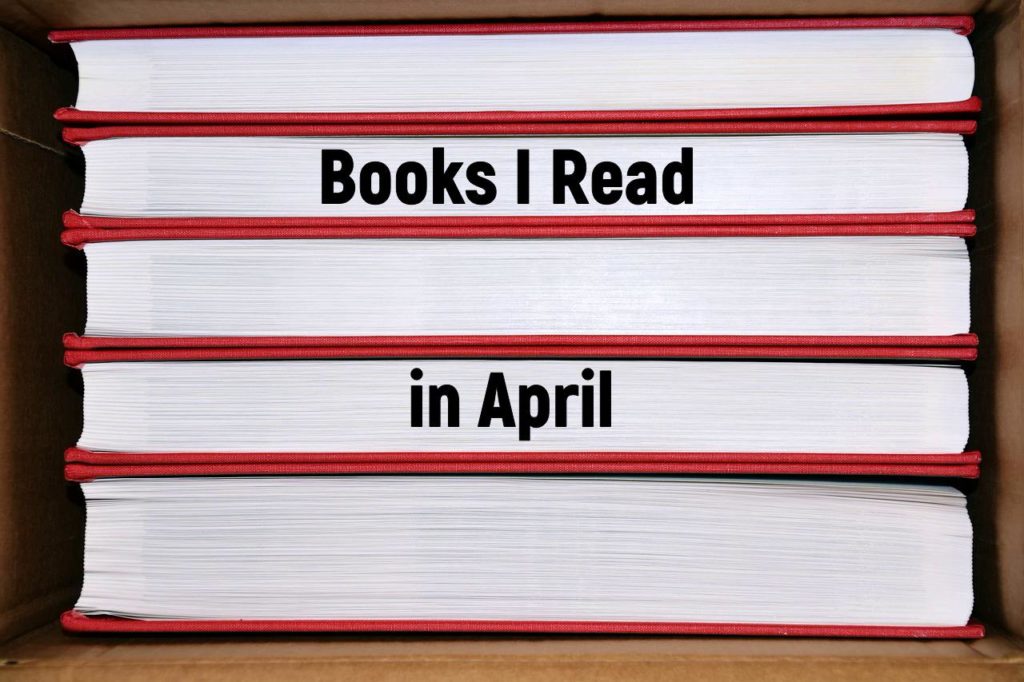What? I read only three books this month? I can’t even begin to figure out how I read so little. The Three-Body Problem is quite long, but still . . .
What Alice Forgot by Liane Moriarty
Pan Macmillan, 2009, rpt.2018

Recommended
When we had to come home early from our world cruise, we flew out of Perth, Australia. With about seven hours to kill at the Perth airport, I spent some time browsing a bookstore near the food court. I wanted to pick up another book by an Australian author. Since I had read and enjoyed Liane Moriarty’s Big Little Lies in preparation for the HBO series, I was drawn to the shelves of her books. I decided on What Alice Forgot to see how Moriarty presents the well-worn thriller trope of memory loss.
Alice Love takes a nasty fall at the gym and wakes up to discover that she has no memory of the last 10 years of her life. She doesn’t know her three children, the oldest of whom is nine, at all, and she can’t understand how she and Nick, the love of her life, could be in the midst of a nasty divorce.
This could be a gloomy situation, but Moriarty instead treats it with light-heartedness and humor. It’s hard not to at least giggle while watching Alice confabulate her way through getting to know her children, who delight in asking questions they know she can’t answer: “Who’s my best friend?”; “What foods do I refuse to eat?”; “What’s my favorite color?” And Alice’s quasi-grandmother is a hoot as she blogs about Alice’s condition while carrying on a running commentary about the eccentric fellow residents of her retirement community.
And yet, underneath the humor, lies Alice’s serious question: How could she and Nick, who had been so much in love, now be so bitterly estranged? Moriarty answers this question in the book’s epilogue, a third-person narration of what happens to the Love family. I would have preferred an ending that involved more showing than telling, but I did appreciate an ending that not only completes the story line but also presents some grappling with serious issues.
© 2019 by Mary Daniels Brown
The Three-Body Problem by Liu Cixin, translated by Ken Liu
Kindle ed.:
Head of Zeus, 2015
Recommended
I’d read so many recommendations for this book that I had to read it. Also, it fit into two categories of my reading plan for 2019: science fiction and translated works.

My science-oriented husband informed me that the three-body problem is an actual thing—a challenging question that mathematicians and physicists work hard at explaining. But I purposely did not look up anything about the three-body problem because, for me, a prime criterion for evaluating science fiction is how well it presents its world to the general public. If a work of science fiction requires specialized, advanced knowledge, it’s not for me.
A good portion of the novel isn’t science fiction at all, but rather an introduction to many of the characters through their experiences during China’s Cultural Revolution. When the three-body problem does finally appear, it does so as a video game played by one of the characters in a virtual reality simulation. The reader learns about the three-body problem along with this character as he becomes more and more involved in playing the game.
And from there the truly science fiction aspect of the novel develops as the player of the video game learns how the game fits in with the government’s secret search for intelligent life elsewhere in the universe.
The Three-Body Problem won a lot of awards:
- Hugo Award for Best Novel (2015)
- Nebula Award Nominee for Best Novel (2014)
- Locus Award Nominee for Best Science Fiction Novel (2015)
- John W. Campbell Memorial Award Nominee for Best Science Fiction Novel (2015)
- Prometheus Award Nominee for Best Novel (2015)
This is a long book (400 pages), and it is the first volume in a trilogy. I plan to read the other two novels eventually. After all, who could resist finding out how the search for other intelligent life in the universe ends?
© 2019 by Mary Daniels Brown
The Silent Patient by Alex Michaelides
Celadon Books, 2019
ISBN 978-1-250-30169-7
Highly Recommended
Here’s the book description from Goodreads:
ALICIA
Alicia Berenson writes a diary as a release, an outlet – and to prove to her beloved husband that everything is fine. She can’t bear the thought of worrying Gabriel, or causing him pain.
Until, late one evening, Alicia shoots Gabriel five times and then never speaks another word.
THEO
Forensic psychotherapist Theo Faber is convinced he can successfully treat Alicia, where all others have failed. Obsessed with investigating her crime, his discoveries suggest Alicia’s silence goes far deeper than he first thought.
And if she speaks, would he want to hear the truth?

I always post my completion of a book on Goodreads to keep track of how many books I read each year. When I filled in my evaluation of The Silent Patient and looked at some of the other posts about it, I was reminded once again of how many readers of mysteries and thrillers seem to base their reviews solely on how early or late in the book they “figured it out”—it being the identity of the story’s villain and/or the plot twist. If they figured it out early, this is a bad book. If they were kept in suspense until the end, this is a good book.
I wonder if many of those readers are skimming, eager to get to the last page and discover the ending as quickly as possible, without reading slowly and carefully enough to appreciate the author’s skill (or, sometimes, lack of skill). For me, the point of a mystery or thriller isn’t just to find out who and/or why done it. I enjoy watching how the writer pulls the reader along and skillfully shapes the reader’s reaction to the narrative, salting both valid clues and red herrings throughout the story.
My copy of The Silent Patient is full of sticky notes marking my reading process. This novel is one of the most skillfully done thrillers I’ve read in a long time. I look forward to Alex Michaelides’s next book.
For more on this novel, see Close Reading: A Pivotal Scene in The Silent Patient.
© 2019 by Mary Daniels Brown

